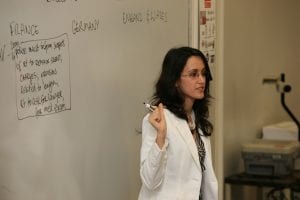
SMU Tower Center Associate Jenia Turner is a law professor at SMU’s Dedman School of Law. For this month’s Center Spotlight we decided to get to know Jenia and ask her about her research and goals.
A lot of your research focuses around plea bargaining. Why did you decide to focus in on this aspect of the criminal justice system?
My first law review article argued that the jury should be more involved in sentencing than it currently is in most U.S. states. I believed that because of its deliberative democratic character, the jury is often better positioned than judges to decide questions of punishment. One of the questions people asked when I presented the paper was, why should we even care about jury sentencing when the vast majority of our cases are plea bargained? And indeed, over 95% of convictions in state and federal cases are the product of guilty pleas, not jury trials. So this led me to focus on plea bargaining and whether there are aspects of that process that can be improved to make it fairer and more accurate.
What has been your biggest takeaway so far?
I strongly believe that our plea bargaining process needs to be better regulated. Courts and legislatures should enact reforms to make the practice more transparent and more likely to produce accurate and just results. Some of the necessary reforms are relatively minor and quite feasible, like requiring that plea bargains be in writing. Others are more ambitious and more difficult, but important—for example, regulating the sentencing discounts that defendants receive for pleading guilty or requiring that prosecutors disclose all relevant evidence before a guilty plea.
Do you have a favorite case you have studied or that you teach? What makes it interesting?
Currently, my favorite case to teach is United States v. Jones. In it, the Supreme Court addressed the question of whether a month-long GPS tracking of an individual’s car, while traveling on public roads, is a search requiring a warrant under the Fourth Amendment. The court held that the GPS tracking was a search, but three groups of justices offered three different rationales for the holding. These three rationales have different implications for how we regulate law enforcement’s use of new technologies, and these are fascinating to explore with students. I am increasingly interested in these types of questions—how the law weighs privacy interests against law enforcement interests in the context of emerging technologies and mass surveillance. Next semester, I will be teaching a new seminar on that topic, entitled Criminal Procedure in the Digital Age.
You have also focused your scholarship on comparative law. What do you find most striking about US law? Is there something that stands out to you as different from most of the world?
One striking difference is how much more prominent democratic principles are in our criminal justice system. We use juries to decide guilt or innocence in criminal cases, and our judges and prosecutors are often elected. In most other countries, this is not the case. This has important implications for how our criminal justice system functions.
What do you think the most effective avenue is for changing the criminal justice system? What changes would you like to see as a result of your research?
I would say that currently, state legislatures are where the most significant, comprehensive criminal justice reform can happen. For example, in Texas we have taken important steps to expand the kind of evidence that prosecutors must disclose to the defense, to regulate eyewitness identification procedures, and to limit the use of testimony given by jailhouse informants. But more needs to be done, particularly in the areas of sentencing and plea bargaining.
What advice would you give to young academics, and specifically young women, who want to follow in your footsteps?
I would encourage them to reach out to people in their field whom they admire and ask them for advice and mentorship. I know that I owe so much of what I accomplished in academia to scores of mentors, who read my drafts, collaborated with me on research projects, invited me to take part in conferences, and helped me with teaching advice. So, I would encourage young academics to look for such mentors, reach out to them, and learn from them.